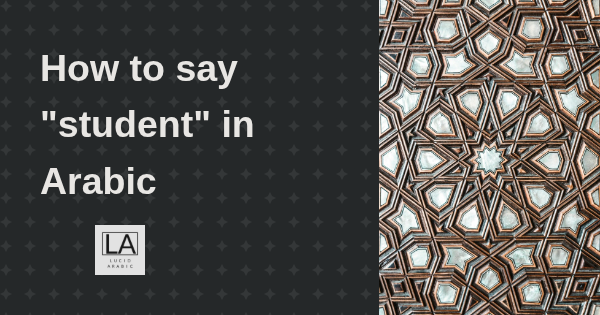Easy & Fun Arabic: Master the Word “Student” (طَالِب) with Confidence
Whether you’re learning Arabic for travel, school, or fun, starting with high-frequency words makes the process more rewarding. One such word is “student” — a word used daily and essential to many conversations.
Let’s break it down, practice it, and explore its cultural context to help you speak Arabic naturally and confidently!
The Arabic Word for “Student”
- English: student
- Arabic: طَالِب (ṭālib)
- Feminine form: طَالِبَة (ṭāliba)
In Arabic, gender matters. That’s why both the masculine and feminine forms are commonly used. The plural is طُلَّاب (ṭullāb) for male/mixed groups and طَالِبَات (ṭālibāt) for female groups.
Pronunciation Guide
Let’s take a closer look at طَالِب:
- طَ (ṭā) — a heavy t sound, pronounced with your tongue flat against the roof of the mouth
- ا (alif) — long a sound
- لِ (li) — light l with a short i
- ب (b) — as in boy
Put it all together: طَا-لِ-ب → ṭālib
And for the feminine version:
طَالِبَة → ṭā-li-ba
The stress is typically on the first syllable.
How to Use “Student” in Daily Arabic
Here are useful phrases with full diacritics to help you read and pronounce confidently:
- He is a student.
هُوَ طَالِبٌ.
huwa ṭālibun. - She is a student.
هِيَ طَالِبَةٌ.
hiya ṭālibatun. - I am a student.
أَنَا طَالِبٌ. (male)
أَنَا طَالِبَةٌ. (female)
ʾanā ṭālibun / ṭālibatun - Are you a student?
هَلْ أَنْتَ طَالِبٌ؟ (to a male)
هَلْ أَنْتِ طَالِبَةٌ؟ (to a female)
hal ʾanta ṭālibun? / hal ʾanti ṭālibatun? - The students are in the classroom.
ٱلطُّلَّابُ فِي ٱلصَّفِّ.
aṭ-ṭullābu fī aṣ-ṣaffi.
Real-Life Usage Examples
Let’s look at a few real-world examples with translations:
- طَالِبٌ فِي ٱلجَامِعَةِ.
ṭālibun fī al-jāmiʿati
(A student at the university.) - طَالِبَةٌ ذَكِيَّةٌ وَمُجْتَهِدَةٌ.
ṭālibatun dhakiyyatun wa-mujtahidatun
(A smart and hardworking student.) - هُمْ طُلَّابٌ جُدُدٌ.
hum ṭullābun jududun
(They are new students.)
Fun Fact About the Word “Student”
The word طَالِب comes from the Arabic root ط-ل-ب (ṭ-l-b), which means to seek or to request. A ṭālib is literally “a seeker” — of knowledge, truth, or answers. The same root gives us:
- طَلَب – ṭalab – request
- مَطْلُوب – maṭlūb – desired
- طَالِبُ عِلْمٍ – ṭālibu ʿilmin – seeker of knowledge (used in Islamic and academic contexts)
So when you say طَالِب, you’re expressing more than a title — you’re describing someone on a journey of learning.
Practice Tip for Beginners
- Daily Repetition:
Pick 2 phrases each day and repeat them aloud 10 times. - Flashcard It:
Write the word on one side, and pronunciation + sentence on the other. Include both طَالِب and طَالِبَة. - Record Yourself:
Say the sentences out loud and compare your pronunciation with a native speaker on YouTube or a language app.
Try These Beginner Sentences
- أَخِي طَالِبٌ فِي ٱلْمَدْرَسَةِ.
ʾakhī ṭālibun fī al-madrasa
(My brother is a student in school.) - هِيَ طَالِبَةٌ فِي ٱلصَّفِّ ٱلثَّانِي.
hiya ṭālibatun fī aṣ-ṣaffi ath-thānī
(She is a student in the second grade.) - هَلْ أَنْتِ طَالِبَةٌ فِي ٱلْجَامِعَةِ؟
hal ʾanti ṭālibatun fī al-jāmiʿa?
(Are you a university student?)
Why Beginners Should Learn “طَالِب”
This word is high-frequency and emotionally positive — most learners or young people identify with it! It’s also gendered, which is a great introduction to Arabic grammar.
By learning it early, you can easily expand your vocabulary with related words like:
- مُعَلِّم (muʿallim) – teacher
- مَدْرَسَة (madrasa) – school
- جَامِعَة (jāmiʿa) – university
- دَرْس (dars) – lesson
Final Thoughts
Learning طَالِب and طَالِبَة gives you a strong foundation in Arabic. It’s a meaningful, positive word that helps you describe yourself and others in one of life’s most important roles — a learner.
With daily practice, you’ll soon be speaking with confidence. Keep going — your effort makes you a true ṭālib of language!

